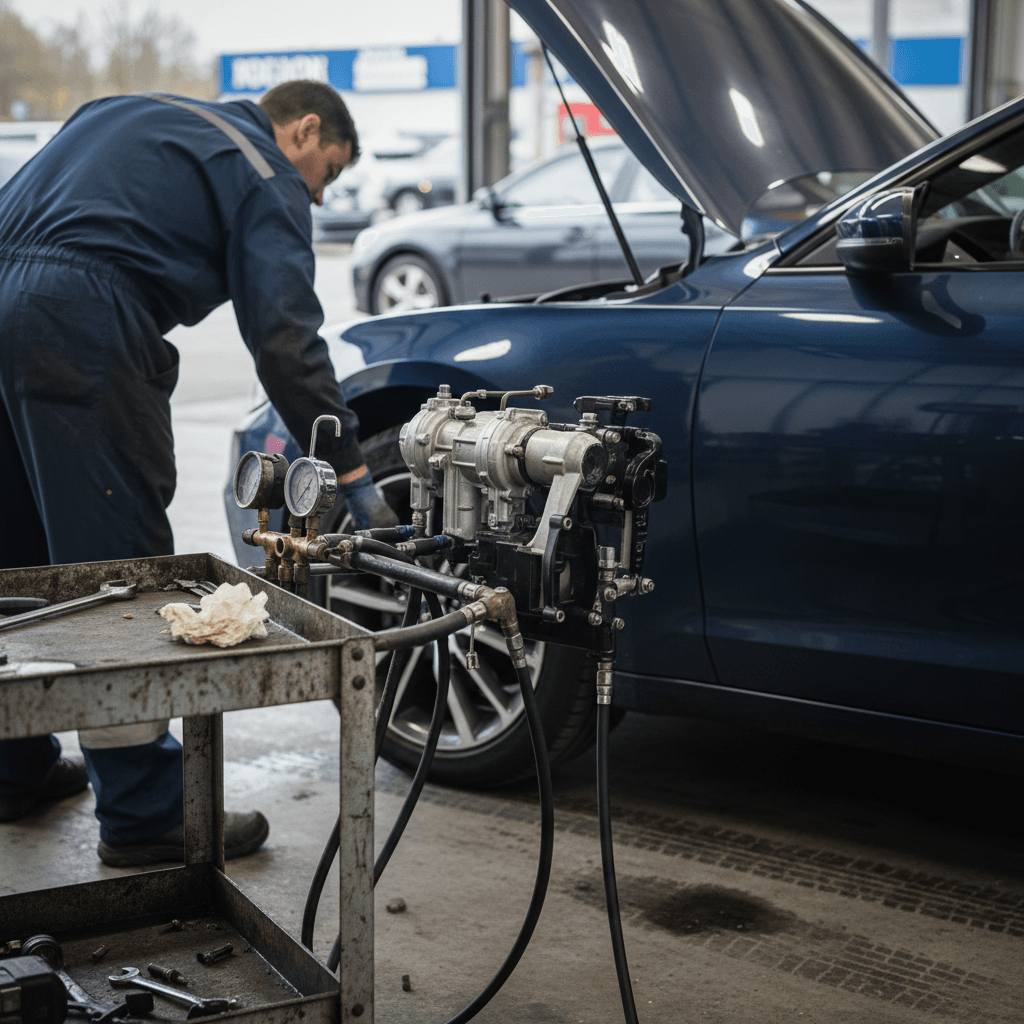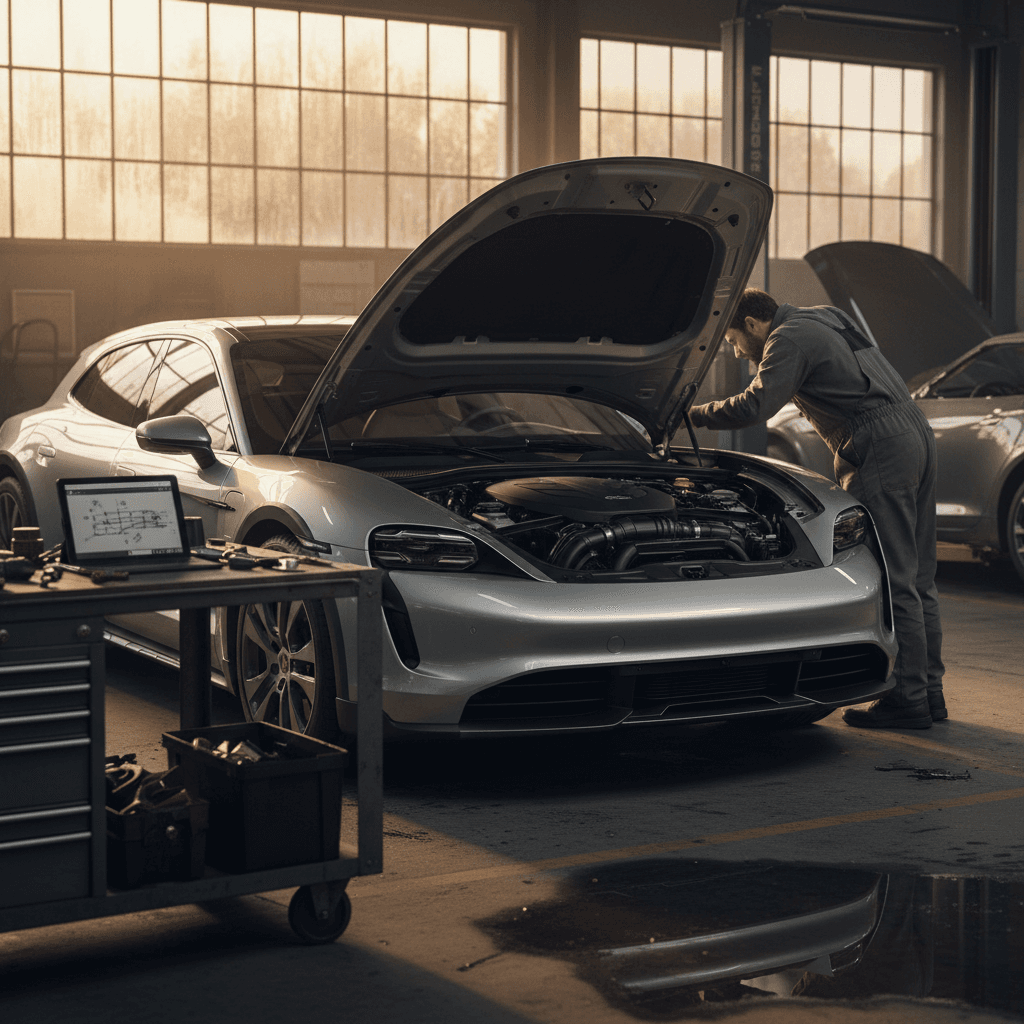If you drive an electric car and type “auto shops near me” into Google, the results can be confusing. Some shops love EVs, some will happily rotate your tires but won’t touch high‑voltage systems, and a few still don’t want EVs in the bay at all. Knowing the difference is the key to saving money, avoiding long waits, and keeping your battery, and warranty, safe.
EV service is growing fast
Why “auto shops near me” is different when you drive an EV
Most of what you see when you search for auto shops near me was built for gas cars. EVs eliminated oil changes and timing belts, but they added high‑voltage batteries, inverters, and complex software. That changes who can safely work on your car and what a neighborhood mechanic can reasonably take on.
- EVs still need traditional maintenance like tires, brakes, alignment, and suspension.
- High‑voltage battery, charging issues, and complex software faults often require an EV‑trained technician.
- Some independent shops are fully EV‑capable; others only handle “wheel end” work like tires and brakes.
- Dealers increasingly have certified EV techs, but they may be more expensive and backed up for weeks.
If you understand where each kind of shop fits, you can confidently use local auto shops near you for routine work and keep the dealer or EV specialist for the handful of jobs that truly require them.
The main types of auto shops near you (and what they’re good at)
Common auto shops you’ll see when you search near you
Each plays a different role in an EV owner’s life.
Franchised dealers
Brand‑specific dealerships (Ford, Hyundai, Tesla, etc.) have direct access to factory tooling and software.
- Best for: warranty work, recalls, complex diagnostics.
- Downside: higher prices, longer waits, mixed customer experience.
Independent general repair shops
Local garages that work on many brands.
- Best for: tires, brakes, suspension, alignment.
- EV caveat: many are still ramping up on high‑voltage systems.
EV‑specialist shops
Shops that advertise EV or hybrid expertise.
- Best for: non‑warranty EV repairs, accessories, and diagnostics outside the dealer.
- Often have EV‑specific lifts, insulation tools, and safety training.
There are also tire chains, body shops, glass shops, and mobile services. Most of them can work on EVs as long as they’re not touching the high‑voltage battery or drivetrain.
Look for EV‑specific language
EV jobs almost any good auto shop near you can handle
The good news is that most of the time, you’re not dealing with a failed battery pack, you’re dealing with the same wear‑and‑tear items every car has. Many of the top EV maintenance items are easy business for a competent local shop.
High‑voltage aside, EVs still need regular service
Tires and wheel alignment
EVs are heavy and deliver instant torque, which is rough on tires. Many owners see tire replacement in the 20,000–30,000‑mile range rather than the 40,000–50,000 miles they’re used to. Any reputable tire shop near you can handle:
- Tire rotations (every 6,000–10,000 miles for most EVs).
- Seasonal tire swaps and storage in snow‑belt states.
- Four‑wheel alignment, especially after potholes or curb hits.
- Road‑force balancing to tame EV‑specific vibrations.
Watch load ratings on replacement tires
Brakes, suspension, and steering
Regenerative braking means pads tend to last longer, but the hardware still needs attention. Many shops already know how to service EV brakes and suspension safely as long as they follow the manufacturer’s lift points and procedures.
- Brake inspections and pad/rotor replacement when worn.
- Annual cleaning and lubrication of calipers in rust‑belt climates.
- Shock and strut replacement when the ride gets bouncy or uneven.
- Steering and suspension checks for play, clunks, or uneven tire wear.
Low‑voltage electrical and general items
For 12‑volt systems and general wear items, EVs look familiar to any mechanic:
- 12‑volt battery testing and replacement when it starts to fail.
- Cabin air filter changes roughly every 15,000–30,000 miles.
- Wipers, bulbs, HVAC cleaning, and basic underbody corrosion checks.
- Visual inspection of the charge cable and plug for damage.
Use local shops to keep costs down
Repairs that still belong at the dealer or EV specialist
Even as independent shops catch up, there are still jobs where “whoever is closest” is not the right answer. For anything involving high‑voltage battery systems, proprietary software, or safety‑critical recalls, you want a dealer or proven EV‑specialist shop, even if it means driving past a dozen generic auto shops near you.
- High‑voltage battery diagnostics, repair, or replacement.
- DC fast‑charging problems (car won’t fast‑charge, charge rate throttling).
- Software faults that require factory tools or over‑the‑air updates.
- Airbag, high‑voltage safety, or thermal‑management recalls.
- Complex driver‑assist (ADAS) calibration after a crash or windshield replacement.
Don’t let just anyone drop your battery pack
How to search for EV‑friendly auto shops near me
Typing “auto shops near me” is just the starting point. The trick is filtering your options for shops that understand EVs, are transparent about pricing, and won’t treat your car like a science experiment.
Three smart ways to find EV‑ready auto shops near you
Use more than one method for the best results.
1. Filter Google Maps results
Search “EV auto repair near me” or your model + “service.” Then:
- Open shop profiles and scan for “EV,” “electric,” or “hybrid.”
- Read recent reviews mentioning specific EV models.
- Look at photos of the shop floor, do you see EVs on lifts?
2. Check apps and owner forums
Many EV owners share local shop recommendations in brand forums and Facebook groups.
- Search “[your city] EV repair” in owner communities.
- Look for detailed stories about successful repairs, not just vibes.
3. Call and listen to the questions they ask
A quick phone call tells you a lot:
- Do they ask for your exact EV model and year?
- Can they describe what they can and can’t do on EVs?
- Are they honest if something is better handled by a dealer?

Checklist: questions to ask before you book
Once you’ve narrowed down a few auto shops near you, treat the first visit like interviewing a long‑term partner. A five‑minute conversation can save you five hours in a waiting room later.
Pre‑visit checklist for picking an EV‑friendly auto shop
1. Do you routinely work on EVs?
Ask which EV models they see most often. If they can name a few, including yours, that’s a good sign. Vague answers like “we can probably figure it out” are a red flag for anything beyond tires and brakes.
2. What EV jobs do you NOT take?
Great shops have clear boundaries. If they say they don’t touch high‑voltage batteries or DC fast‑charging problems, that’s not a deal‑breaker, it’s honesty.
3. Are your technicians EV‑trained or certified?
Listen for mentions of OEM training, community‑college EV programs, or ASE L3 (hybrid/EV) certification. Training signals they take EVs seriously.
4. How do you handle parts and software updates?
For simple jobs like brakes, aftermarket parts are fine. For software‑related issues, a good shop will either refer you to a dealer or coordinate with one rather than guessing.
5. Can you give me a written estimate and explain the line items?
Price frustration is one of the top complaints from EV owners. Ask for a clear estimate and make sure they’ll call you before doing extra work.
6. What’s your typical turnaround time for EV work?
Special‑order parts and limited EV techs can create bottlenecks. If your car is daily transportation, ask how long similar jobs have taken recently.
Bring your maintenance schedule
Typical EV maintenance costs at local shops
Exact pricing varies by region, but EV maintenance costs at independent auto shops near you are often similar to, or lower than, gas cars, especially when you avoid the dealer for routine work. Here’s a ballpark view based on recent industry guides and shop menus.
Common EV maintenance jobs and typical local shop pricing
Use this as a rough reference, always get a written estimate from the specific shop you choose.
| Service | Recommended interval (typical) | Typical independent shop cost (USD) | Who can usually do it? |
|---|---|---|---|
| Tire rotation | 6,000–10,000 miles | $50–$80 (often free with tire purchase) | Any tire or auto shop |
| New tires (set of 4, EV‑rated) | 20,000–40,000 miles | $600–$1,200+ | Tire shops, dealers |
| Brake pad replacement (all four) | As needed | $300–$450 | Most independent shops, dealers |
| Brake fluid flush | Every 2–3 years | $100–$160 | Independent shops, dealers |
| Alignment | As needed (potholes, uneven wear) | $120–$200 | Tire or alignment shops |
| Cabin air filter | 15,000–30,000 miles | $60–$120 | Independent shops, DIY, dealers |
| Shock/strut replacement | As needed | $500–$1,000+ | Independent shops, dealers |
| Battery coolant service (when required) | Every 5–10+ years or per manual | $150–$300 | Dealer or EV specialist |
Dealer prices can be higher; independent shops may be lower, especially for tires and brakes.
Why dealers still matter, strategically
How Recharged fits into your service and repair plan
If you bought, or are considering, a used EV from Recharged, you’re not starting from zero. One of the biggest concerns with used EVs is battery health and future repair costs. That’s exactly why every Recharged vehicle comes with a Recharged Score Report that includes verified battery diagnostics and a clear picture of how the car has been used.
1. Start with a clear baseline
The Recharged Score helps you and any auto shop near you understand the car’s current condition, battery health, mileage, and usage patterns. That makes it easier to prioritize which maintenance items to address first and which can wait.
2. Use EV‑specialist support when you’re unsure
Not sure if an issue is a tire problem, a suspension problem, or the start of a battery concern? Recharged’s EV‑specialist team can talk through symptoms, help you interpret warning lights, and point you toward the right kind of shop, local tire store, independent garage, or brand dealer.
Because Recharged is a fully digital retailer with nationwide delivery, you’re free to choose the auto shops near you that fit your budget and schedule, not just whatever’s bolted onto a traditional dealership. And if you’re trading in or selling, our instant offer and consignment options can reflect the value of a well‑maintained EV with documented service history.

Auto shops near me for EVs: FAQ
Frequently asked questions about EV‑friendly auto shops
Bottom line: choosing the right auto shop near you
When you search for auto shops near me as an EV driver, you’re really asking two questions: who can handle everyday wear items cheaply and conveniently, and who do you trust for the rare but serious EV‑specific problems? The answer is almost never a single shop.
Use trusted local garages and tire shops for tires, brakes, alignment, and basic maintenance. Save the dealer or EV specialist for high‑voltage, software, and warranty work. If you’re shopping for a used EV, or already own one from Recharged, lean on the Recharged Score and EV‑specialist support to make smarter choices about where you spend your service dollars. That mix of local convenience and expert backup is what makes EV ownership simpler, safer, and more predictable over the long haul.

